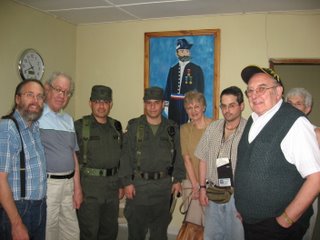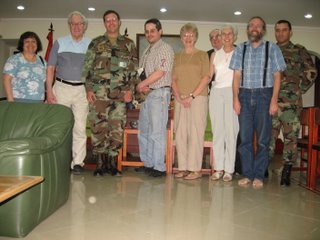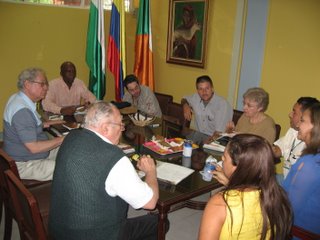Tuesday: Dominant classes
We spent Monday visiting with subalterns at San Josecito, and in contrast we spent Tuesday with the dominant sectors of society. It provides an interesting study in contrasts.

We started out the day with Lt. Colonel Hector Miguel Cruz Rocha of the National Police. The armed forces in Colombia have 4 branches: Army, Navy, Air Force, and Police. As a result, the police tend to be more militarized than in some countries, and their functions tend to blur with those of the army. They often coordinate activities, and to a casual observer even their uniforms appear to be similar. We were concerned about the police presence in the peace community San Jose de Apartado. The Lt. Colonel said that while they respect the community’s space, the armed forces have a right to be there. He bragged about the progress they had made in bringing people and social services into the community. A common problem they face are demobilized paramilitaries who turn to common criminal activities.

Our second meeting was with Colonel Jorge Arturo Salgado Restrepo who was second in command of the 17th brigade. Salgado had spent several years training in the United States, and spoke good English. He projected a smooth image of the Colombian military as a professional force with a strong concern for human rights and the concerns of the community. He spoke of this as a post-conflict period in which the feeling of sense of security in the zone has dramatically increased. After any combat operation, the military closes down the site for a civilian investigation. The Colonel spoke of concerns for legitimacy, and winning the hearts and minds of the people. He had a very positive image of Colombia.

Our third meeting was with the mayor José Phidalgo Banquero Zapata of the municipality of Apartado. While the police and military betrayed paternalistic attitudes toward the peace community, the mayoral staff’s attitudes bordered on condescending and disdain for their efforts. They were the most impoverished of the municipality’s four regions, and their resistance to social development programs meant that they lagged behind. It was for their own good to accept a police command post in the community. Before members of the peace community were not receptive to the municipality’s efforts, but now that they had left the has government brought in new inhabitants and life has improved in the urban center of San José. We received reports that documented a drop in homicides from 2004 through 2006, but a sharp jump again in the first two months of 2007. Although the municipality claims that the police presence has brought more security, and although it appears that most of the homicides are intrafraternal violence among paramilitary groups, the officials complained that only the guerrillas had not demobilized and were the source of the lingering problems.
Three different dominant class visions of the problems facing San Jose de Apartado, and each of them radically different from the subaltern critiques of the rural farmers we visited the day before.
We started out the day with Lt. Colonel Hector Miguel Cruz Rocha of the National Police. The armed forces in Colombia have 4 branches: Army, Navy, Air Force, and Police. As a result, the police tend to be more militarized than in some countries, and their functions tend to blur with those of the army. They often coordinate activities, and to a casual observer even their uniforms appear to be similar. We were concerned about the police presence in the peace community San Jose de Apartado. The Lt. Colonel said that while they respect the community’s space, the armed forces have a right to be there. He bragged about the progress they had made in bringing people and social services into the community. A common problem they face are demobilized paramilitaries who turn to common criminal activities.
Our second meeting was with Colonel Jorge Arturo Salgado Restrepo who was second in command of the 17th brigade. Salgado had spent several years training in the United States, and spoke good English. He projected a smooth image of the Colombian military as a professional force with a strong concern for human rights and the concerns of the community. He spoke of this as a post-conflict period in which the feeling of sense of security in the zone has dramatically increased. After any combat operation, the military closes down the site for a civilian investigation. The Colonel spoke of concerns for legitimacy, and winning the hearts and minds of the people. He had a very positive image of Colombia.
Our third meeting was with the mayor José Phidalgo Banquero Zapata of the municipality of Apartado. While the police and military betrayed paternalistic attitudes toward the peace community, the mayoral staff’s attitudes bordered on condescending and disdain for their efforts. They were the most impoverished of the municipality’s four regions, and their resistance to social development programs meant that they lagged behind. It was for their own good to accept a police command post in the community. Before members of the peace community were not receptive to the municipality’s efforts, but now that they had left the has government brought in new inhabitants and life has improved in the urban center of San José. We received reports that documented a drop in homicides from 2004 through 2006, but a sharp jump again in the first two months of 2007. Although the municipality claims that the police presence has brought more security, and although it appears that most of the homicides are intrafraternal violence among paramilitary groups, the officials complained that only the guerrillas had not demobilized and were the source of the lingering problems.
Three different dominant class visions of the problems facing San Jose de Apartado, and each of them radically different from the subaltern critiques of the rural farmers we visited the day before.

